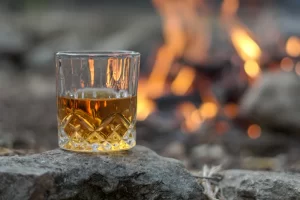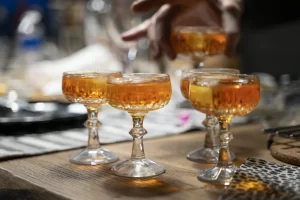Native American Heritage Month: Honoring Traditions & Supporting Businesses
Native American Heritage Month is a time to celebrate the rich and diverse cultures, traditions, and contributions of the indigenous peoples of the United States. This is an opportunity to explore the history, heritage, and unique aspects of Native American culture. Today, we’re going to chat about Native American Heritage Month, discuss indigenous alcohol production, and highlight ten distilleries owned by Native Americans in the United States. Let’s get started!
Native American Heritage Month
Native American Heritage Month, previously known as National American Indian Heritage Month, is an annual celebration that provides a platform for recognizing and honoring the contributions, history, and cultures of Native Americans.
When Is Native American Heritage Month?
The month of November was chosen for this observance to commemorate the significant role Native Americans have played in shaping the history and development of the United States. It lasts all month long, from November 1st to November 30th.
When Did We Start Observing Native American Heritage Month?
President George H. W. Bush officially designated November as Native American Heritage Month in 1990, and it has since become a time for educational programs, cultural events, and activities that highlight the enduring impact of indigenous peoples. It’s an occasion to deepen our understanding of Native American history, art, music, and traditions, fostering appreciation and respect for their vibrant and diverse communities.
How to Participate in and Observe Native American Heritage Month:
Participating in and observing Native American Heritage Month is an excellent opportunity to engage with and appreciate the rich and diverse cultures of indigenous peoples in the United States. It’s a time to celebrate, educate, and honor the enduring traditions and contributions of Native Americans. Here’s how you can actively participate and observe this important month:
#1: Educate Yourself
Most of us think we know the whole story, and we might even avoid thinking about it – after all, it was a pretty dark time in our country’s history. However, understanding the challenges and triumphs of Native Americans throughout history is a significant part of participating in this month.
We can educate ourselves about the history, cultures, and traditions of indigenous peoples through books, documentaries, and online resources that provide valuable insights into Native American heritage.
#2: Attend Local Events
Many communities and organizations host events, workshops, and cultural exhibitions throughout November to celebrate Native American Heritage Month. These events provide an excellent opportunity to engage with indigenous culture, art, and history. Attend powwows, cultural festivals, and art exhibitions to immerse yourself in the vibrant traditions of Native American communities.
What Are Powwows?
Powwows are vibrant and culturally significant gatherings within Native American communities. These events bring together indigenous people from various tribes to celebrate their traditions through dance, music, and art.
At a powwow, you’ll witness mesmerizing dances, each with its unique style and meaning, as well as hear the rhythmic beat of traditional drumming. Powwows provide a space for sharing stories, connecting with ancestral roots, and reinforcing the bonds of community. They are vital in preserving Native American culture and fostering a sense of unity and pride among indigenous peoples.
#3: Support Indigenous Art and Crafts
Native American artisans create stunning and unique pieces of art and crafts, including jewelry, pottery, textiles, and more. Consider purchasing authentic indigenous art as a way to support local artists and honor their creativity. These pieces often carry deep cultural significance and can be cherished as valuable mementos.
#4: Learn from Native American Voices
Listen to Native American voices and stories. Read books, articles, or listen to podcasts and interviews by indigenous authors, activists, and leaders. This can provide you with diverse perspectives and a better understanding of the contemporary issues faced by Native American communities.
#5: Visit Museums and Cultural Centers
Many museums and cultural centers across the country offer exhibits dedicated to Native American history and culture. Plan a visit to these institutions to explore artifacts, artwork, and historical narratives that shed light on the heritage of indigenous peoples.
#6: Support Indigenous-Owned Businesses
As mentioned beofre, there are indigenous-owned businesses, including distilleries, that you can support during Native American Heritage Month and beyond. These businesses not only contribute to the economic prosperity of indigenous communities but also promote cultural preservation.
Support Indigenous-Owned Distilleries (Native American Owned Distilleries)
Not only do these distilleries craft exceptional spirits, but they also represent a celebration of cultural heritage and the resilience of Native American communities. By choosing their products, you contribute to the preservation of their traditions and the economic well-being of these businesses, making a positive impact during Native American Heritage Month and throughout the year.
We’ve listed 10 distilleries you can support at the end of this article, so be sure to browse through the (non-exhaustive!) list.
#7: Engage in Dialogue: Talk With People!
Engaging in open and respectful dialogue about Native American heritage is a meaningful way to participate in this month. Share what you’ve learned with friends and family, and encourage discussions about the significance of Native American cultures in the United States. Promote awareness and understanding in your social circles.
#8: Volunteer and Contribute
Many Native American organizations and initiatives rely on volunteers and contributions to support their efforts. Consider getting involved with organizations that work to preserve indigenous cultures, improve the well-being of Native American communities, or protect sacred lands.
#9: Show Respect
While participating in Native American Heritage Month, it’s essential to show respect for the cultures and traditions of indigenous peoples. Avoid appropriating or misrepresenting their culture, and be sensitive to their perspectives on issues that affect their communities.
#10: The Most Important Part: Continue Beyond November
Native American Heritage Month is a time to start or deepen your engagement with indigenous cultures, but it’s essential to continue this commitment beyond November. Respect, appreciation, and support for Native American heritage should be ongoing efforts throughout the year, becoming a part of our daily lives.
Traditional Alcohol Production: The History of Native American Alcohol
Alcohol has held a unique place in the cultural and ceremonial practices of many Native American tribes for centuries. Various tribes crafted their own alcoholic beverages using locally available ingredients. These traditional beverages often played integral roles in tribal rituals, celebrations, and social gatherings. Two well-known examples are chicha, a fermented corn or maize-based beverage, and pulque, a fermented agave sap drink.
Chica
Chicha is made by chewing and fermenting corn in the mouth, a practice known as “mastication fermentation.” After the corn is chewed and spit out, it is left to ferment, resulting in a mildly alcoholic drink. The Chicha brewing process represents a unique combination of cultural practices and resourcefulness, with its roots dating back thousands of years to pre-Columbian times.
Pulque
Pulque, on the other hand, is made from the fermented sap of the agave plant, which is most famously used to produce tequila. This traditional drink, originating in Mesoamerica, has a history dating back over 1,000 years. The production of pulque was both a skill and a spiritual practice, with traditional ceremonies performed to bless the agave plants and the pulque itself.
The Impact of European Alcohol on Native Peoples
While many traditional methods of alcohol production are still practiced today within Native American communities, the introduction of easy-access European spirits, such as whiskey and rum, significantly impacted indigenous cultures. These commodities were mostly obtained through trade, historically.
Like the rest of America, Indigenous communities tend to struggle with substance abuse, and this conversation is very closely tied to the controversial legislation that has been part of our laws in the past. If you would like to learn more about this, there is a wealth of information online. This is a sensitive subject and should be approached with caution, grace, compassion, and understanding.
Indigenous-Owned Distilleries (Native American-Owned Distilleries) to Support This November:
Why is it so important to support Native American distilleries? Did you know that it still wasn’t officially legal for Native Americans to own distilleries on their own land until December of 2018? That’s right – one small law from Prohibition had persisted until just a few years ago, making it so that America’s Indigenous people couldn’t legally own distilleries. However, now that this has been fixed, we’re starting to see an uplifting interest in Native American-Owned distilleries.
As of October 30th of 2023, there are only two (at least ranking), legal distilleries we can list.
Copper Crow Distillery
You can check out Copper Crow Distillery’s website for yourself, but here’s a summary for now:
Copper Crow Distillery is a prominent indigenous-owned distillery located in Bayfield, Wisconsin. This family-owned business is known for its dedication to producing high-quality spirits that reflect both Native American culture and the natural beauty of the region.
Copper Crow’s unique approach involves utilizing locally sourced ingredients, including heirloom grains and fruits, to create a range of artisanal spirits, such as whiskey, vodka, and fruit brandies. Their commitment to preserving tradition and the environment shines through their eco-friendly practices and sustainable distillation methods.
As an indigenous-owned distillery, Copper Crow not only delivers exceptional spirits but also serves as a symbol of cultural pride and entrepreneurship, contributing to the ongoing celebration of Native American heritage.
Read About Copper Crow’s Intriguing Spirits: Copper Crow makes spirits from Wisconsin cheese, plants, mushrooms
Talking Cedar Distillery
While Talking Cedar Distillery is not officially run by a Native American individual, tribal member Harry Pickernell, Sr. is tribe Chairman. He has also helped spread brand awareness, and the Paskenta Band of Nomlaki Indians benefit from the casino-adjacent distillery.
Talking Cedar Distillery, situated in Washington state, is a renowned indigenous-owned distillery known for its exceptional craft spirits. This family-owned business is deeply rooted in Native American heritage, incorporating traditional elements and sustainable practices into its distillation processes.
Talking Cedar produces a diverse array of spirits, including vodka, gin, and whiskey, often featuring unique regional flavors. The distillery’s commitment to eco-conscious production and cultural preservation reflects its mission to honor indigenous traditions and connect with the land.
Read More: The Inside Story Of The First (Legal) Native American Distillery
In Summary: Celebrate and Support, but Don’t Stop with November
Native American Heritage Month is a time to commemorate the vibrant and diverse cultures of indigenous peoples in the United States, but it should serve as a reminder that our celebration and support should extend beyond November.
While this month provides a focused opportunity to learn, engage, and appreciate Native American heritage, it’s crucial to maintain these efforts throughout the year. Continue to educate yourself, support indigenous-owned businesses, and engage in respectful dialogue. By doing so, we not only honor the enduring traditions and contributions of Native Americans but also promote ongoing awareness and understanding of their rich and diverse cultures.
Let Native American Heritage Month be a starting point for a year-round commitment to celebrate and respect the indigenous peoples of our nation!









